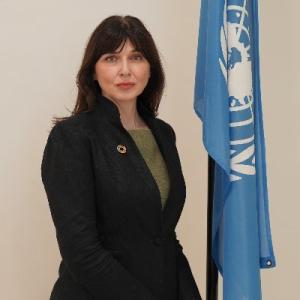Distinguished Guests:
It is my pleasure to join the Opening Ceremony of Baku Decides: Youth Climate Negotiations.
As Azerbaijan prepares to host the Climate Conference -COP29 in November this year, it is great to see young climate champions from the region and beyond come together in Baku, to discuss concrete initiatives and partnerships for climate actions, across borders.
Allow me, therefore, to start by congratulating the organizers, for convening this important event.
Distinguished Delegates:
The climate emergency is the most significant intergenerational injustice of our time.
And it will continue to disproportionately affect young people – our children, our grandchildren. Research shows that children, adolescents and youth will be uniquely impacted by climate change.
A child born in 2020 will face twice the risk of experiencing wildfires, 2.6 times the risk of drought, 2.8 times the risk of river floods and 6.8 times the risk of heatwaves, compared to their grandparents born in 1960.
Through various global youth movements, young people are raising their voices to advocate for access to decision-making spaces and for mechanisms to enable them to contribute to the design, implementation, and review of climate policies and programmes at all levels.
Yet despite these efforts, a lack of political will and a lack of understanding still remains among governments on how to meaningfully engage youth in developing, implementing, and reporting on climate actions.
Meaningful inclusion of young people in climate action is part and parcel of inclusive society with policies and social services that are fair for all ages.
There are three things we should be focusing on:
First, promoting participatory approaches. There is need for youth-led participatory approaches in climate research, policy, financing, programming and monitoring and evaluation as a way of centering the needs and priorities of the youth. The COP 28 Presidency has launched a new global initiative, the ‘International Youth Climate Delegate Program’ and engaged youth climate champions pre-COP in defining youth demands. 100 youth climate champions from developing countries were provided opportunity to participate in COP 28 meetings and discussions. And I hope for COP 29 we will be able to go a step further in young people’s engagement.
Second, green education and harnessing skills of youth in entrepreneurship, digitalization and innovation. All generations – not only the young – would need to be educated on what climate change is and its effects, but more importantly on protection and mitigation measures. The incorporation of green education to all levels of education will play a key role in creating awareness and integrating climate solutions across all levels of society.
In addition, youth are increasingly becoming the most connected age group constituting 71% of people aged 15–24 globally who are online, compared to only 48% of the total population. These skills need to be tapped into when exploring ways of addressing climate risks.
Third, building resilient youth institutions and strong youth leadership capabilities. There has been increasing attention on the role of young people within the climate change space, with young people demonstrating leadership globally and bringing attention to the climate crisis.
Distinguished Participants:
At the UN, in line with the vision laid out in the Youth 2030 Strategy, the Secretary-General has launched his Youth Advisory Group on Climate Change to bring youth climate movements and voices closer to UN leadership, and to provide advice and inputs in the implementation of his Climate Strategy.
As the UN in Azerbaijan, we are committed to continue to work with young people to accelerate climate action.
Under the UN Azerbaijan Sustainable Development Cooperation Framework (2021-2025), one of the priority areas for cooperation is “Protecting the Environment and Addressing Climate Change.” In supporting the country’s ambitious priorities for green transition, we will also continue to support efforts to reduce inequalities and address structural barriers to meaningful youth engagement.
We look forward to continuing to work with the Government, climate change practitioners, development actors and young people for a successful COP29 and to ensure that the world we leave to the future generations is clean, green, sustainable, and healthy.
Thank you.




